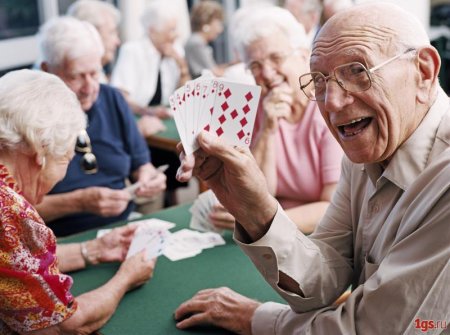The development of new activities prevents brain aging
With increasing life expectancy maintaining mental faculties in old age is becoming more urgent. It has long been known that the maintenance of an active lifestyle and exercise of intellectual activity significantly improve brain function in older people. Nevertheless, certain types of mental activity and neurophysiological mechanisms underlying this phenomenon remained unknown. Employees of the University of Texas conducted a study will shed light on this question.
Three elderly group of volunteers engaged in various types of mental activity. The first group to perform more complex tasks that require active learning: mastering digital photography or the art of patchwork (quilting). The second group was engaged in affairs which do not require active learning: travel and cooking. The third group was assigned a job that requires a minimum of mental stress: listening to music, casual games, watching classic movies.
After 14 weeks, all subjects underwent a variety of tests that determine the status of the cognitive functions of the brain. Significant improvement was observed only in the first group. Tests have shown that the people involved more difficult tasks, improved memory. In addition, their brain more efficiently use its resources to meet the challenges of assessing the meaning of words. Functional magnetic resonance imaging (MRI) showed that for the analysis of the meaning of difficult words activated areas in their brain, responsible for attention and semantic analysis. However, when analyzing the meaning of simple words the brain activity was much lower. A similar pattern is typical for young people.
The second and third groups of the brain activated equally strong for the analysis of both simple and complex words. Thus, it was found that the brains of the participants of the experiment the first group more efficient use of its resources for understanding the meaning of words.
A staff member of the University of Texas discovery indicates that significantly improve the health of the aging brain can only sessions that require active learning. Simple activities (playing long familiar board games or travel, for example) had virtually no effect on the cognitive functions of the brain.
Three elderly group of volunteers engaged in various types of mental activity. The first group to perform more complex tasks that require active learning: mastering digital photography or the art of patchwork (quilting). The second group was engaged in affairs which do not require active learning: travel and cooking. The third group was assigned a job that requires a minimum of mental stress: listening to music, casual games, watching classic movies.
After 14 weeks, all subjects underwent a variety of tests that determine the status of the cognitive functions of the brain. Significant improvement was observed only in the first group. Tests have shown that the people involved more difficult tasks, improved memory. In addition, their brain more efficiently use its resources to meet the challenges of assessing the meaning of words. Functional magnetic resonance imaging (MRI) showed that for the analysis of the meaning of difficult words activated areas in their brain, responsible for attention and semantic analysis. However, when analyzing the meaning of simple words the brain activity was much lower. A similar pattern is typical for young people.
The second and third groups of the brain activated equally strong for the analysis of both simple and complex words. Thus, it was found that the brains of the participants of the experiment the first group more efficient use of its resources for understanding the meaning of words.
A staff member of the University of Texas discovery indicates that significantly improve the health of the aging brain can only sessions that require active learning. Simple activities (playing long familiar board games or travel, for example) had virtually no effect on the cognitive functions of the brain.

